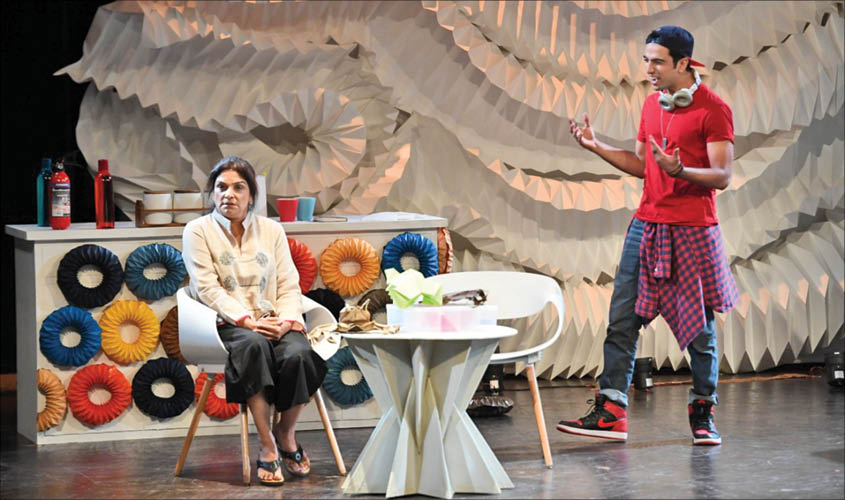Playwright Rajiv Joseph’s Animals Out of Paper, about three sensitive, lonely people and their anxious efforts to relate to each other, is a discerning, fine-spun drama. The play takes you on a dramatic expedition into the lives of three characters as complex as the Japanese art of origami—in these lives, emotions explode one fold at a time. Though the vibe of each character is different, together they all resonate.
This quirky comedy about the collision of mismatched people was screened at the Stein Auditorium at Delhi’s India Habitat Centre last weekend. It was presented by Scene Stealers, a Calcutta-based theatre group.
Throughout the course of the play, the art of origami acts as an excellent metaphor for grief, loss, mistakes, experiences and countless hidden emotions. Each crease is a memory etching a groove into the heart, each crease has potential to permanently change the form of relationships, and each crease is proof that relationships leave marks, no matter how they end.
Directed by Aditee Biswas, the play revolves around Neena, a world-renowned origami artist, despondent and lonely until her paths cross with Andy, a calculus teacher and biggest admirer of her work—well, maybe more than just her work, as is pretty evident from the very first scene.
Andy convinces Neena to tutor his teenage student, Suresh, a prodigy. Thus, the play’s three intriguingly flawed characters begin to reshape and mould each other’s lives in much the same way they fold and crease their origami art.
The play’s storyline is simple. It deals with everyday emotions in everyday lives. What stands out is the seamless representation of the complexly layered characters. None of them is placed on a pedestal—they are ordinary and relatable. The dialogues are the true essence of the main narrative, and the grace with which the actors perform them is what etches the play in the audience’s mind.
Veteran actor Vivek Mansukhani, founder of Scene Stealers, playing the character of Andy, is effortless on stage. Having soaked in the character, he not only feels Andy, but makes the audience do the same along with him. Andy is funny, shy, and starkly smitten with Neena, a woman who mirrors his deeper loneliness. His presence sparks the onset of comedy in the play, but the comic effect is not forced—it is deftly woven to allay an otherwise intense plot.
Andy owns a notebook of blessings, an element central to the storyline, in which he lists everything that he feels blessed about—a rather optimistic aspect of a self-deprecating man who wears pain on his sleeve. As he claims, “Life is short, opportunities are scarce, love is rare!”
There are moments in the play where Andy’s emotions are all over the place, but his positive outlook on life nevertheless is sure to tug at your heart’s strings.
Operating on a completely different tangent is the character of Suresh, Andy’s most endeared student in math class. Seventeen years old, Suresh is the embodiment of conventional millennialism with a penchant for high-school pop lingo and hip-hop music (blasting out of the headphones perpetually glued to his ears). But smothering beneath this flamboyant surface is a hotbed of unshared emotions rather atypical to a boy his age. Suresh is not only a genius at math but, as it turns out, has an uncanny aptitude for origami.
Actor Sriharsh Sharma, who sings and raps in real life—much like his character, Suresh—portrays the sullen and brilliant teen with charm. A high-school boy who has just lost his mother, Suresh feels comforted by Neena’s presence right from the moment they meet. They share a healthy rapport, until Neena is offered a chance to attend an origami conference in Nagasaki and decides to take her student instead of her suitor.
The trip to Japan forms a turning point in the storyline as it brings Neena and Suresh closer than ever. An emotionally reserved Suresh finds himself vulnerable, and ends up getting physically involved with his favourite teacher’s ladylove. It is then that the plot thickens and the characters confront their real feelings while their lives take new shapes.
At one point, Suresh says, “I feel like I don’t understand myself anymore.” To which, Neena responds, “Well then, welcome to your entire life, Suresh.”
Brooding alone in her messy windowless studio apartment, only thing half qualified as living between scraps of paper, Neena comes across, at the beginning of the play, as a tediously one-dimensional depressive. It is only after she is involved with Andy and Suresh that her character acquires some colour and authenticity.
Played by Geeta Sudan, Neena’s character falls somewhat behind in comparison to the other two, who downright outshine her in terms of performance. She is beautiful on stage, but lacks the spark and stage presence. By the end of the play, when some relationships have imploded and others have grown, we return to Neena, alone in her windowless studio. But this time, the same space, is a clutter of new memories.
Director Aditee Biswas ingeniously strings colourful and intricate origami structures, created by Ankon Mitra, across the stage. A Sangeet Natak Akademi’s Bismillah Khan Yuva Puraskar awardee, she has mostly worked on physical theatre, a genre involving storytelling primarily through physical movements and gestures. This production was one of the first dialogic scripts she has experimented with.
Biswas told Gaurdian 20 that she would now like to further develop the play. Before the next show, likely to take place in August, she intends to flesh out each scene and go deeper into the equation of the characters, to delve into the questions of politics and gender that are there in the original script of Animals Out of Paper by Rajiv Joseph.

